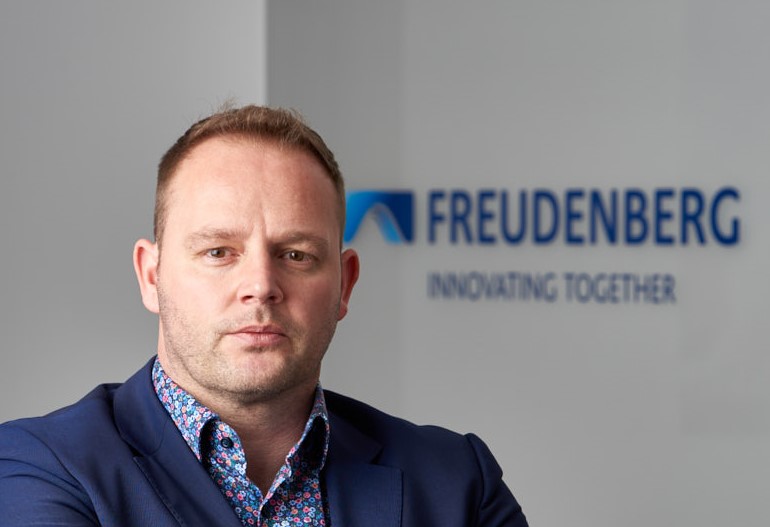As of last April, Freudenberg Sealing Technologies (FST) battery and fuel cell business has been bundled into a new Business Group, Freudenberg e-Power Systems (FEPS). The Group is clearly positioning itself with customers and partners as a leading provider of emission-neutral energy systems for heavy-duty applications. Battery systems are already being developed and manufactured on an industrial scale at Freudenberg facilities in the United States, while the market for fuel cell systems is still in a relatively early stage of development. Michael Milch, Vice President, Strategic Customer Programs for the fuel cell business, discusses the opportunities that are opening up, how Freudenberg is making headway in the market, and where the challenges lie.

Michael Milch, Vice President, Strategic Customer Programs for the fuel cell business / © Nicolas Gradicsky Photodesign Event-Fotograf
Mr. Milch, when will we reach the point where we no longer miss the use of diesel and other traditional fuels in the heavy-duty sector?
It is impossible to name a particular year. That would leave out much of the answer. In the heavy-duty sector, which includes trucks, buses, ships and trains, you find very different constraints and many challenges to overcome before fuel cell systems can be introduced on a wide scale.
Let’s take long-distance buses as an example. As part of our HyFleet project, we are cooperating with Flixbus, a bus operator, among other partners. When the first phase of the project ends in 2025, FlixBus is planning to bring at least 50 fuel cell vehicles into its fleet. By 2027/28, we expect another technological leap, leading us to assume that overall fuel cell operating expenses could be comparable to diesel or even less costly before 2030. That would make them technologically and commercially competitive. In short, long-distance bus operators won’t miss diesel technology from that point on.
We expect an identical development in truck applications. With strategic partners like ZF Group, we are relying on integrated projects that will lead to a sustainable product launch. Major fleet operators are directly involved in our work.
What is the situation in other segments such as shipping on the high seas?
Our “Silver Nova” project stands out in this area. Teaming up with our strategic partners, Meyer Werft in shipbuilding and Royal Caribbean Group as the owner and customer, the “Silver Nova” cruise ship will be the first of its kind worldwide. The entire hotel load, that is, the energy demands for everything not related to propulsion, can be covered with a fuel cell-battery hybrid system. A fuel cell capacity of 4 megawatts and a battery capacity of nearly 1 megawatt-hour are being installed. Freudenberg developed and manufactured both subsystems in their entirety.
Liquid natural gas (LNG) powers the ship’s main drive system. So we will be equipping our fuel cell product line with an integrated LNG reforming technology. That means pure hydrogen does not fill the tanks directly for further transport to a fuel cell. Instead, an LNG system on board feeds the fuel cell systems. They transform the LNG into a hydrogen-rich gas that the fuel cell processes.
Covering the hotel load is an early, interim step toward the complete replacement of internal combustion engines in the shipping industry. Fuel cell-battery hybrids will gradually replace the current propulsion systems, eventually ending the role of internal combustion engines. The first plans for these changes have already been worked out. The project showcases the strengths of Freudenberg and the new Business Group quite nicely.
Today we can even zero in on made-to-order hybrid solutions. We don’t think in technology silos.
What are those strengths?
We can deliver everything from a single source if our customers would like us to. That gives them a responsible point of contact, from the development of the application, all the way to the production, startup and servicing of the entire hybrid system of fuel cells and batteries. The result is that we can provide all-around or very specific support, depending on the application and the customer’s requirements. We are flexible on this.
For years, our customers have trusted our technologies, know-how and capacity for industrialization in the battery and fuel cell business. Thanks to targeted steps in our development work, we have steadily expanded our position in the market and are giving our customers significant added value thanks to the longevity and efficiency of our systems and the focus of our development activities. Today we can even zero in on made-to-order hybrid solutions. We don’t think in technology silos. But we do have a special feature and a key distinguishing characteristic: It is our flexibility and consulting expertise as we design the best energy solution from the customer’s standpoint in every case.
Where are the remaining challenges?
We are now seeing a technological upheaval as we pursue the goal of a climate-neutral society. The changes involve every sector, including transportation, energy and manufacturing. The impact is accordingly substantial. Different questions have been raised, and we have to find the answers to them: How can we “green” our society by producing ecologically harmless hydrogen in sufficient amounts? How can we build up the required fueling infrastructure? How can we manufacture a highly efficient fuel cell technology on a mass scale that meets the needs of the heavy-duty sector?
These challenges involve a new technology, and a market still has to be shaped for it. We want to actively make a contribution to the effort. We are looking beyond our own horizons and, along with our strong partners in this project, we are taking the entire value creation chain into account. This is crucial if we hope to make climate neutrality more than just a technological possibility. We want it to be economically achievable as well.
